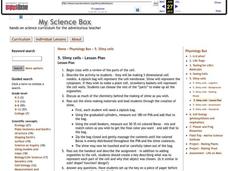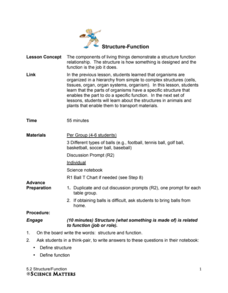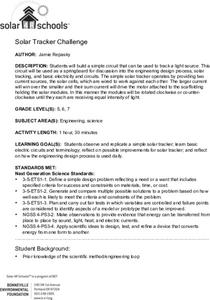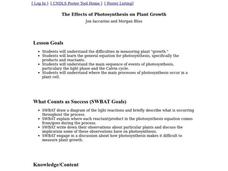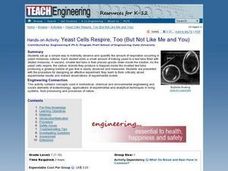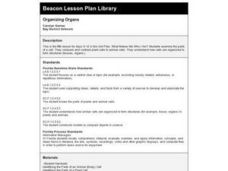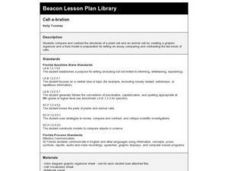Curated OER
Inside of a Cell
For this cell worksheet, students complete a graphic organizer by determining what organelles are found in plant or animal cells and their functions.
Curated OER
Cells
Students are introduced to the life cycle of a cell. In groups, they identify and describe the function of organelles. They compare and contrast the differences and similarities between plant and animal cells as well. They complete a...
Curated OER
How Cells Reproduce
Learners construct a mitosis flip book. In this biology lesson, students describe the different stages of mitosis. They discuss the importance of cell reproduction.
Curated OER
Seeing Cells
Sixth graders study living cells and their functioning units. In this cell lesson students color cell diagrams, answer questions and discuss the differences between plant and animal cells.
Curated OER
Slimy cells
Learners study the parts of a cell. In this chemistry lesson students complete an activity in which they make as much slime as they want.
Curated OER
The Giant Cell
After actively participating in a unit on cells, the students act out and become the organelles. They will act out and explain the functions of what each of the organelles do for the cell.
Curated OER
The Good and Bad Bacteria
Students are able to name one kind of harmful bacteria and why it hurts us and also name one kind of helpful bacteria and how we use it. They describe the process of growing bacterial cultures in a lab. Students create a reasonable...
Curated OER
Introductory Bacteria and Virus Worksheet
Compare and contrast eukaryotes, prokaryotes, and viruses with a chart and a Venn diagram. Beginning microbiologists consider motility, reproductive ability, DNA content, and the presence of organelles. They write short answers to...
Curated OER
Looking At Plants and Animals
Even though the presentation is connected to a particular textbook, it could be used in any lower elementary classroom to review plants. There are diagrams and colorful graphics that make it attractive and engaging.
Concord Consortium
Aquapores
Aquapores allow water to travel through cell membranes while keeping other molecules out. The animation offers an up-close look at these parts of the cell membrane. It explores multiple vantage points and shows the importance of these...
Curated OER
Science Jeopardy
Wow! Review an entire semester of biology curriculum playing this Science Jeopardy game! The variety of topics is extremely broad, so you will need to review each question to find if they all apply to your course. As you find material...
Science Matters
Structure-Function
Without structure, there wouldn't be function. Scholars examine the meaning of structure and function with a hands-on experience. Using balls from different sports, they compare and contrast their structures and then analyze how each...
Bonneville
Solar Tracker Challenge
Follow the light—not with one's eyes—but with a special solar tracker. Future engineers design and build a device that tracks light. They must build circuits in which solar cells rotate to receive equal amounts of light.
Curated OER
The Effects of Photosynthesis on Plant Growth
Students are able to draw a diagram of the light reactions and briefly describe what is occurring throughout the process. They are able to explain where each reactant/product in the photosynthesis equation comes from/goes during the...
Cold Spring Harbor Laboratory
Genetic Inheritance Follows Rules
Rules are not meant to be broken in genetics. Scholars learn to build Punnett squares to track the inheritance of dominant and recessive traits in an interactive animation activity. Online questions help individuals reflect on their...
Howard Hughes Medical Institute
Recent Adaptations in Humans
You've probably spent plenty of time discussing animal adaptations with your young biologists, but what about human adaptations? Explore the evolving traits of humankind through an interactive that combines text and video clips. Scholars...
Science Matters
Formative Assessment #6: Photosynthesis Cellular Respiration
You know you taught it, but did they learn it!?! A quick formative assessment asks pupils to describe both photosynthesis and cellular respiration before showing how they relate to each other. The lesson marks the 20th lesson in a...
Curated OER
Animal Cell
In this cells learning exercise, students color and label 8 items in a drawing of an animal cell. Answers are not provided. Students use colored pencils only.
Curated OER
TE Activity: Yeast Cells Respire, Too (But Not Like Me and You)
Student observe and quantify the respiration that occurs in yeast-molasses cultures. They complete an effective experiment in order to examine how to think critically about the results.
Curated OER
Biology: Make a Model Cell
Young scholars compare and contrast plant and animal cells and then create a model of the latter. They visit Websites to view the cells and answer questions about them. In pairs, students create cell models using plastic baggies,...
Curated OER
Animal Nutrition
Use this great overview to give information on all aspects of nutrition. By working their way through this PowerPoint, students review a lot of information about the digestive process. Students read many facts on a number of...
Curated OER
Plant and Animal Cells KWL Chart
In this plant and animal cells worksheet, students complete a KWL chart, writing what they know, want to learn and have learned about the topic. Worksheet contains a link to additional activities.
Curated OER
Organizing Organs
Fifth graders research plant and animals cells and create a Venn Diagram to show the similarities and differences.
Curated OER
Cell-a-bration
Fifth graders study the structures of a plant cell and animal cell. They create a graphic organizer and a food model. Finally, they write an essay comparing and contrasting plant and animal cells.




